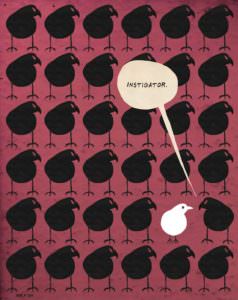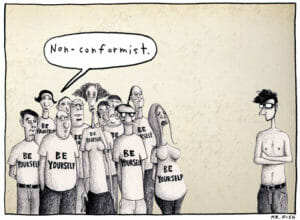Will the Mighty Blockbuster Fail and the People Be Saved?
As "Godzilla" storms the box office this weekend, observers note that the entertainment industry's lust for high profits via mega-hits is narrowing the number and kinds of stories told and amplifying conformity among the public.
As “Godzilla” storms the box office this weekend, observers note that the entertainment industry’s lust for high profits via mega-hits is narrowing the number and kinds of stories told and amplifying conformity among the public, Jennifer Rankin reports at The Guardian.
In the book “Blockbusters,” published by Harvard University Press, author Anita Eberse writes that 70 percent of Warner Bros.’ 2010 revenue came from its four most expensive films — “Harry Potter and the Deathly Hallows Part I” (budget $250 million), “Inception” ($175 million), “Clash of the Titans” ($125 million) and “Sex and the City” ($100 million). “The entertainment industry is moving more towards a winner-take-all-market,” Rankin quotes Eberse as writing.
Rankin points out that the phenomenon “is not restricted to the silver screen. The average high street bookshop may stock thousands of titles, but the profitable inventory is just 10 or 20 books. And Spotify reported in January that one in five of the four million songs on its music-streaming service had never been listened to. This is the flipside to a celebrated study from 2008, which found that just 52,000 tracks or 0.4% of the catalogue of online music stores accounted for eight out of 10 downloads.”
Andrew Bud, a co-author of a 2008 study on music streamed online, notes, as Rankin writes, that “popularity is infectious.” According to Bud, “Choices in music are not determined by availability; choices in music are determined by social forces. People listen to the things that [other] people listen to.”
To describe how people’s behavior changes “when faced with a stupendous number of choices,” Rankin cites Paul Ormerod, an economist who has studied online social networks. Ormerod says people “are more likely to copy and emulate [others] whose judgments they trust. In this model something starts to become popular not because of its objective qualities, but because it is already popular.”
Rankin adds: “Any YouTube visitor knows this,” and “The same dynamic drives people to click on ‘most-read’ lists on newspaper websites.”
Long-understood sociology shows that the resulting conformity is expressed in the evolution of a less vibrant and diverse culture and the virtual sameness of consumers’ — or citizens’ — thoughts, behaviors and speech.
— Posted by Alexander Reed Kelly.
Your support matters…Independent journalism is under threat and overshadowed by heavily funded mainstream media.
You can help level the playing field. Become a member.
Your tax-deductible contribution keeps us digging beneath the headlines to give you thought-provoking, investigative reporting and analysis that unearths what's really happening- without compromise.
Give today to support our courageous, independent journalists.






You need to be a supporter to comment.
There are currently no responses to this article.
Be the first to respond.